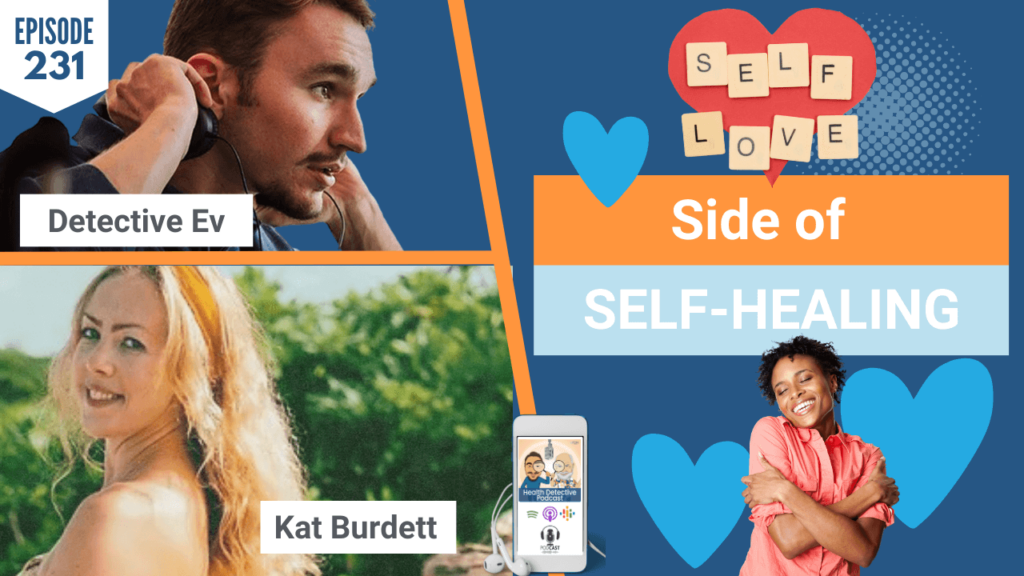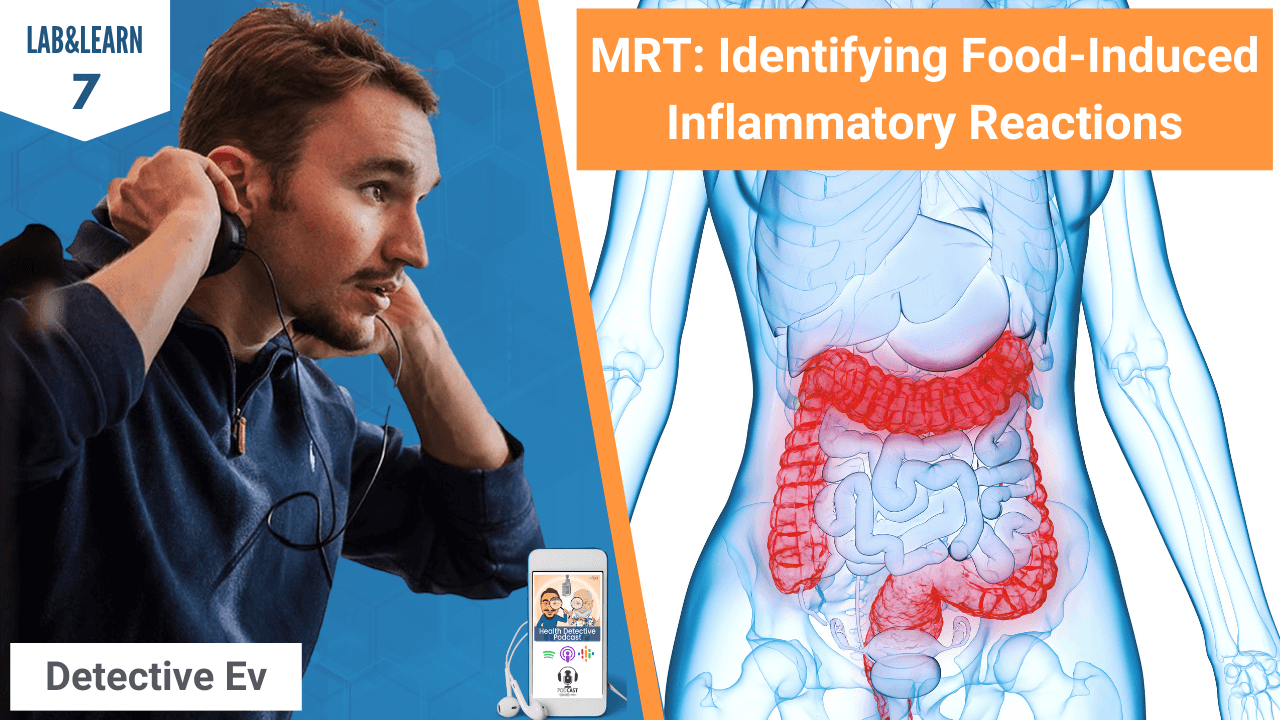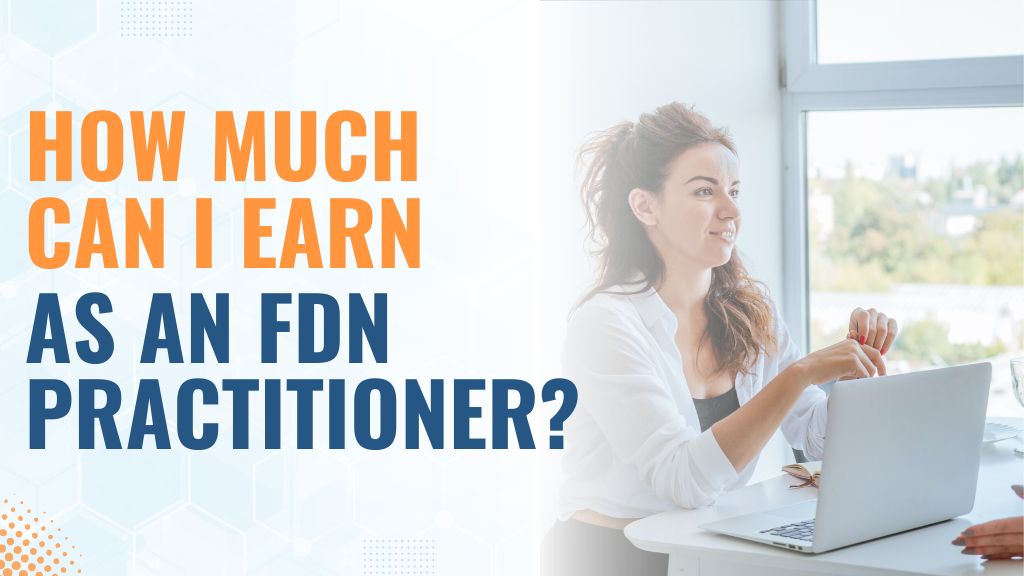Introduction
[00:00:00] Detective Ev: Hello everyone and welcome back to another episode of the Health Detective Podcast by Functional Diagnostic Nutrition. My name is Evan Transue, aka Detective Ev. I will be your host for today’s show about self-love.
We are back post wisdom tooth surgery, feeling good, but it’s a little interesting. I’m going to the doctors actually again today. I got this crazy pain in the almost cheekbone now. Supposedly it could be normal, but apparently not normal enough that they’re bringing me back in.
The good news is the teeth themselves have very little pain. In fact, I would go as far as to say two out of the three of them are kind of fine. I mean, they’re just good, they’re healed. The one that seems to be connected to the cheekbone pain, is still a little raw, still a little tender, but I’ll get that all checked out today. Hopefully there’s nothing major here.
The good and bad news is that I can be pain free, that’s good. But the bad news is I have to take like 400 to 600 milligrams of ibuprofen to actually do it. Obviously, I do not want to keep eating ibuprofen nonstop. So, we’re working through that. But hey, we’re able to do interviews and sound half normal again on the podcast.
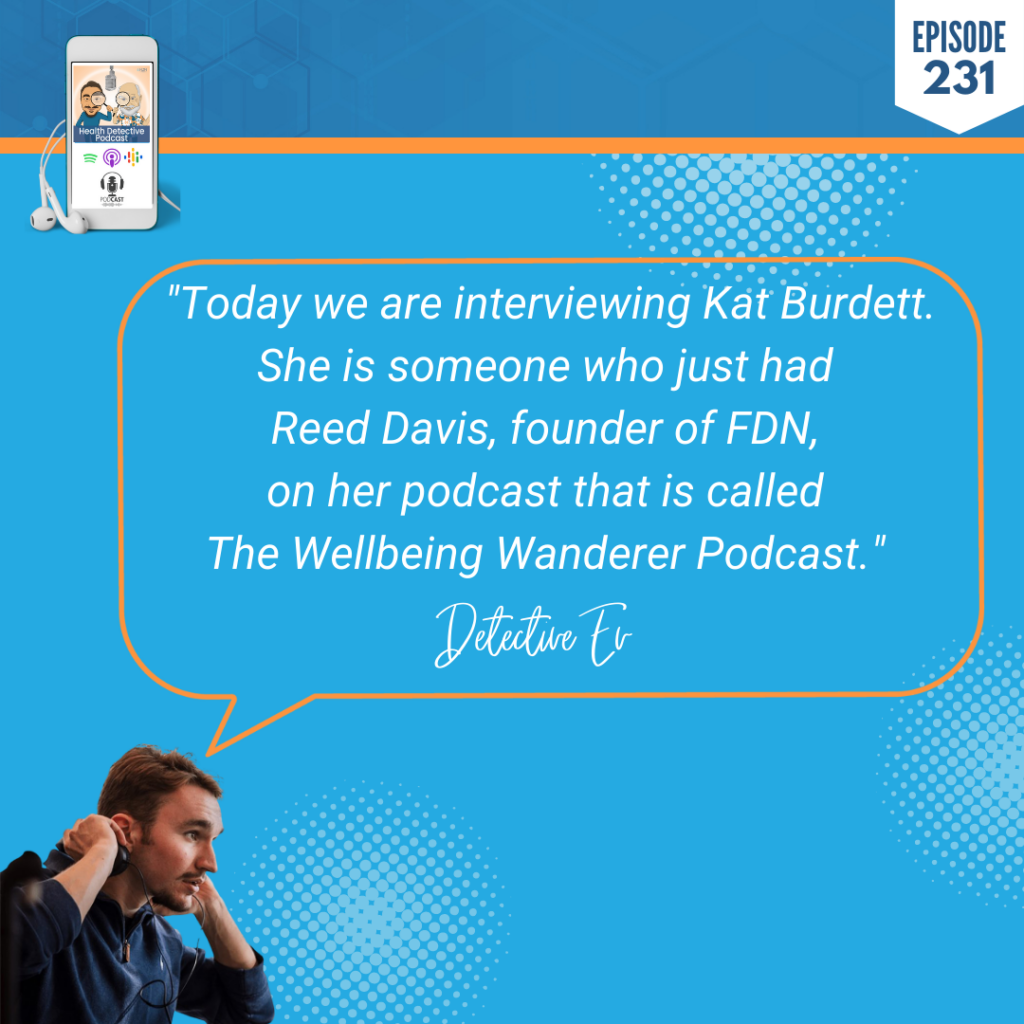
Today we are interviewing Kat Burdett. She is someone who just had Reed Davis, founder of FDN, on her podcast that is called The Wellbeing Wanderer Podcast. I’ll have the link to the interview in the show notes. It is already released at the time of us releasing this episode here.
A Bit About Kat
She’s not someone that has had like autoimmunity or anything like that. She is someone who helps individuals focus on the self-love side of things and really getting to the core of what might be going on emotionally. We thought she’d be an interesting person to bring on and talk to, especially because of her career that she had prior to getting into this work. We did talk about that in the beginning of the podcast.
Let me read her bio. It’ll give you some background and then we’ll get right to this one. Kat is a radiation therapist turned holistic wellness coach. Working in a radiotherapy department and treating cancer patients for 13 years, taught her how short life can be. It gave her the momentum and courage to start her own coaching business, helping people to love themselves, feel mentally and emotionally balanced, and enjoy the gift of life through a holistic lifestyle.
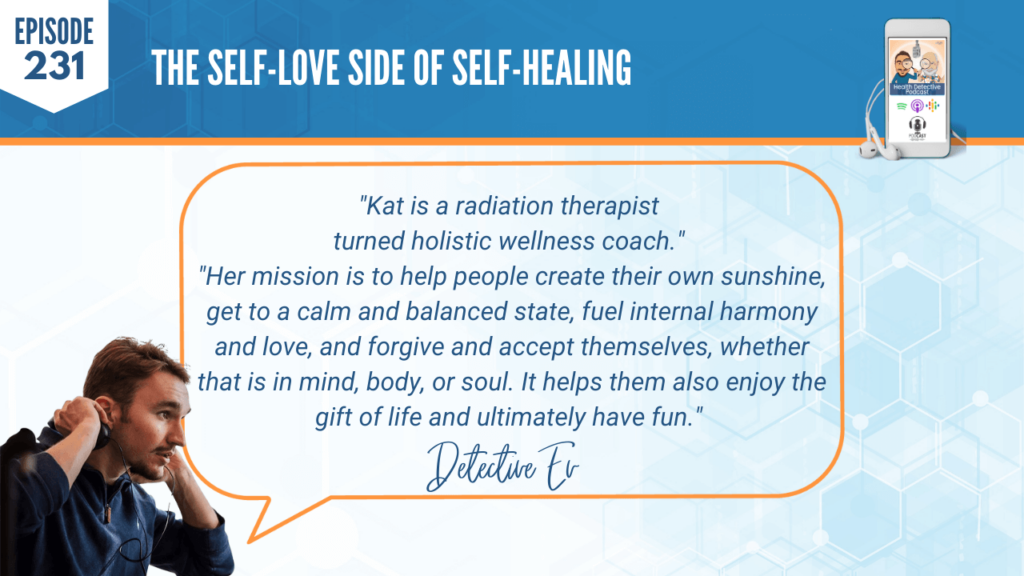
She focuses on self-love, self-care, and mindset, providing people with both practical and spiritual tools that equip them to handle whatever life throws at them. Her mission is to help people create their own sunshine, get to a calm and balanced state, fuel internal harmony and love, and forgive and accept themselves, whether that is in mind, body, or soul. It helps them also enjoy the gift of life and ultimately have fun.
I would like to do all of those things, I’m kind of doing all of those things, but there’s always room for improvement. Hey, I’m sure you’d like to do that as well. Without further ado, let us get to today’s episode.
Hello there, Kat. Welcome to the Health Detective Podcast. How are you?
[00:02:49] Kat Burdett: I am great. Thank you Evan. Excited to be here today.
Self-Love: The Unique Perspective on Health
[00:02:52] Detective Ev: Yeah, I’m excited to have you. This is going to be fun. I already had mentioned to the audience in the intro, this is gonna take a little bit of a different route. I think they really appreciate it at this point, 200 something episodes in.
You know, it’s amazing to hear these very similar health stories of people going through the mystery symptoms, utilizing lab testing, and all that stuff. But there’s more to healing than just those aspects. We do need that as a core part of FDN, but we like to bring on people who can offer unique perspectives on the health side of things so that you guys have more tools in your tool belt.
I was talking to Kat off air before we were recording. It took me several years before I even was identifying as like the emotional or spiritual side as being on my radar for health stuff. I was very, okay, if I eat this food, it will do this to my labs probably, and then I should be better, and all my problems will be fixed. But I’ve had just such a deeper understanding over the years of like how much the emotional and trauma side matters.

Then there’s people that come on here and it’s amazing what they deal with. They were eating all the right foods, they’re taking all the right supplements, but they finally deal with that stuff, and that was what led them to getting there. I’m getting ahead of myself. I want to start with your journey.
Self-Love: A Completely Exhausting Job
Normally we start off the show with what health symptoms was the person dealing with. And we had discussed that you had some mental health stuff going on, but I’m mostly curious right now about what job and career path you were in prior to becoming the person you are now, because I know that you were working with cancer patients.
[00:04:19] Kat Burdett: Yes, I was. I am actually a qualified radiation therapist or therapeutic radiographers we say in the UK. Within that job I work in a radiotherapy department, and I treat people’s cancer to either cure the cancer or to palliate the pain. I did that job for 13 years and three years training involved in that. I can always dip back into that if I want to as well.
It is a very intensive job. You literally don’t stop, you can’t make any mistakes, and you’re obviously caring for people as well. That’s the part of the job that I really, really loved. I always just had this instant rapport with people. People just naturally wanted to open up to me, they trusted me straight away, and it made me a really good radiographer. I like to think I was more so good at the technical stuff, I guess my colleagues can tell you that. But yeah, that was the part that I really loved.
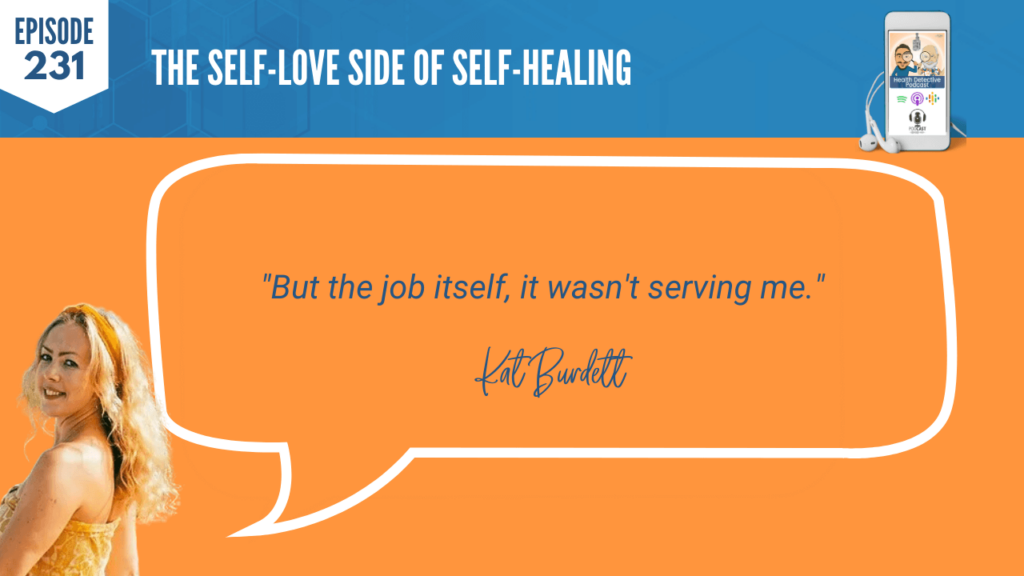
But the job itself, it wasn’t serving me. I was obviously in a hospital. There’s artificial light. I didn’t have time to go to the toilet. I didn’t have time to fill up my water bottle when I was on the treatment units. I was treating 30 to 40 patients a day.
Self-Love: A Calling to Help People
You’re going in and out, in and out of a room and then hearing the same issues all the time. You’re dealing with people’s anxieties, dealing with people’s side effects of the treatment. Some of them are having chemotherapy at the same time. As you can imagine, it was completely exhausting.
As I say, I love, love, love the people’s side of it. That’s why I do what I do now, because I want to help. But it wasn’t helping me. It just left me burnt out, it left me exhausted. In all honesty, I’m still really recovering from that today. I think burnout, especially in a workplace, especially in a hospital, can take a very, very long time to actually recover from that and feel the body to regulate again. Obviously, I realized that I was capable of helping people in a different way.
[00:06:21] Detective Ev: Cool. When you got into that job, I can only think from an American perspective, when someone gets into a job like that, it’s usually one of two things. Either one, I mean, maybe they did have a personal experience in their family and that’s how they want to help the patients. But two, it’s also just considered like a decent career path here. Like it’s a good job, it’s technical, would pay well.
Was this just something that you got into originally because I know you like the people side, a job’s sake, or was there something that called you specifically to it?

[00:06:47] Kat Burdett: Yeah, absolutely. There was something that called me. This wasn’t even on my radar. Like before this I started at my career wanting to be a graphic designer. I went all the way to film with College of Arts, did three months and thought, no.
Self-Love: Needing a Deep Connection with People
After that I was training to be a dancer. Then I realized that I wanted a job helping people. I didn’t know what that was. You know, I looked up about nursing and I was like, it sounds good, but it just doesn’t really resonate. Then I read about radiotherapy, and I just had this gut feeling, this intuitive, yes. I was like, this is the job for me. I want to help people. That’s what got me into radiotherapy.
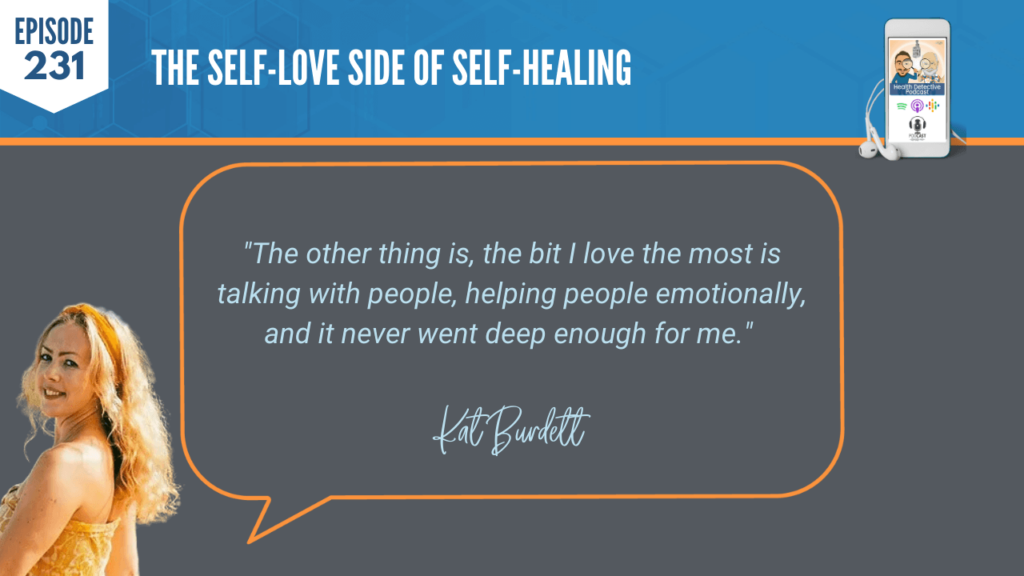
But what I didn’t realize is it was just a part of my path, and it wasn’t everything I was supposed to be doing. It may be a steppingstone that has taken me to where I am today. The other thing is, the bit I love the most is talking with people, helping people emotionally, and it never went deep enough for me. I mean, also, we only got 15 minutes with each patient upon average. So, I wanted something deeper; I wanted more connection.
To answer your question, that’s initially why I got started with it. I always knew that working with people and helping them is something I wanted to do.
[00:07:59] Detective Ev: Yeah. Well, you said on average it could be like 30 to 40 patients a day. I mean, there’s barely any time to get your first and last name, let alone actually connect with this individual. And the burnout for people that are in these careers is so true. I feel like this is actually universally true. I know America handles the healthcare thing a little differently. For better, in some ways, for worse in others, obviously.
Self-Love: Burnout Leads to Mistakes
My sister’s a nurse and I love her to death. She is not as open yet to the holistic side of things. This poor girl is going out, I mean, three nights, four nights a week, sometimes doing night shift, like literally starting the shift, I believe, at 7:00 PM or 9:00 PM and working all the way into the morning. What’s so crazy to me is, we know as health professionals that this is killing people, but the people that are working these jobs are supposed to be helping the sick people. That’s where it’s kind of scary.
You’re talking about how burnt out you got, which is totally justified and makes sense, but you are treating people, in a certain way. It’s like we need to honor our folks that are treating the sick people a little better and help make it a more sustainable system. Something seems like not a great idea to me to have these burnt out, exhausted people helping the sick people that need it most and are probably burnt out and exhausted in their own way. That’s kind of crazy. Right?
[00:09:11] Kat Burdett: Absolutely, yeah.

Also, that’s how mistakes happen. You can’t push your staff too much. And with something like radiotherapy, you know, you’re delivering radiation to a person, there is no room for mistakes. Occasionally mistakes happen, and they usually happen because of burnout, because of exhaustion. This is why healthcare professionals in particular, I feel, really need to prioritize their self-care and really need to show themselves a lot of love because it is highly stressful. I have so much respect for the people that have done it for like 10, 20, 30 years.
Self-Love: Care Givers are Affected Emotionally and Physically
They’re still out there on the treatment floor doing this, walking in and out of a treatment room, out of a bunker all day long, and dealing with everything. It’s not an easy job and I really think that the pay should be better for one thing. I’m just gonna say that. They should be given a lot more credit.
It’s like with my job, you know, you’ve got the physical aspect, you’ve got the mental aspect, and the emotional as well. Of course, there are also times when you get upset by what you see. Because some people come to us, and then they find out the day before that they’ve got metastatic cancer, cancer that has spread to everywhere. Then they’re told, oh, you’ve got a week to live. Then we have to then just go in, give them a single blast of radiation to help palliate the pain. Sometimes it upsets you.
I’m actually a highly, highly sensitive person, which I pride myself on now, I never used to. You know, you think how could I even survive in that environment? The sad thing is you do kind of get used to it and build a resilience. But occasionally there are times when you might get that one patient that reminds you of your mom or reminds you of your dad or reminds you of a friend, and that’s when it makes it really hard.
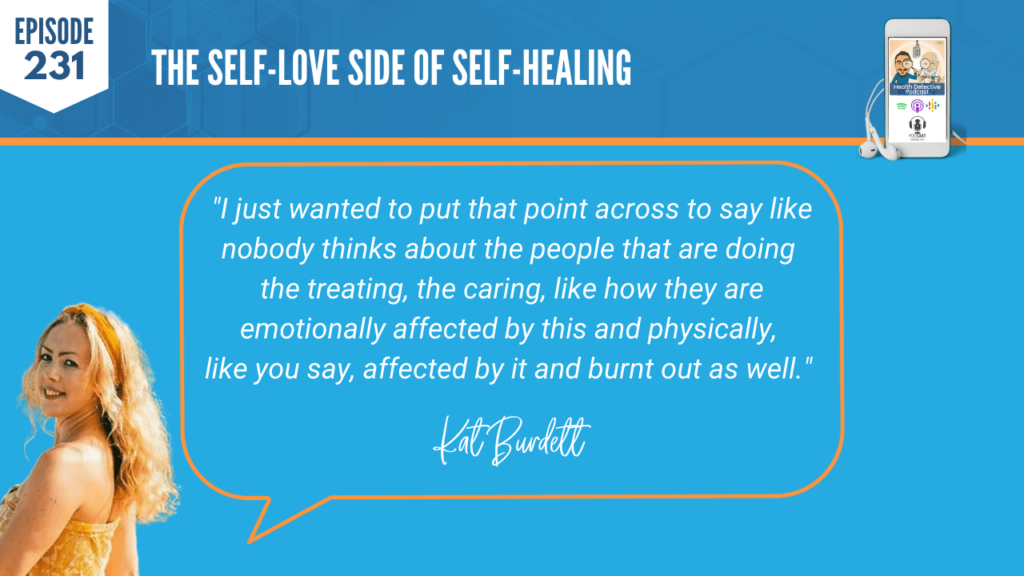
I just wanted to put that point across to say like nobody thinks about the people that are doing the treating, the caring, like how they are emotionally affected by this and physically, like you say, affected by it and burnt out as well.
[00:11:08] Detective Ev: There’s a real lesson there that actually I don’t think I think about enough.
Self-Love: Too Much in Too Little Time
But one of the things that we advocate for all the time on this show is this merger between functional/natural medicine and Western. I’m sure you see this as well. It’s getting better, but there’s still this dilemma where like Western thinks the functional people are all voodoo, science, hippie, which is not true. But then you get some people that are in the functional/natural side and now they’re against everything Western, thinking that they’re the bad people. I’m like, all right, this is a little crazy. If we’re actually trying to help people, we should want the best of both worlds. That should be the goal.
But I think what you just said really brings something to light. I mean, the job itself, even just physically, is hard. But let alone what you’re actually seeing, 30, 40 people a day, and you’re working with people who have cancer. These are not particularly light diagnoses. I was just actually thinking about this two weeks ago. I know it sounds a lot simpler than cancer, but it is something to actually ponder.

I got my wisdom teeth out. It was just amazing to me that this doctor has like three different patients in other rooms. He is about to have me go under on drugs, which potentially could cause complications if they mess up even a little bit, rip three teeth out of my mouth in 30 minutes, then bam, onto the next one. Again, I don’t think that’s the same emotional type of thing as seeing someone with cancer or a week to live come into your area.
Self-Love: Western Medicine Vs. Holistic Side of Things
I don’t want to remove teeth from someone’s mouth. It’s like creepy, you know what I mean? Like there’s all this stuff going on and then he’s gonna go do that 10, 12 more times that day, at least probably. So, yeah, I think what you just said is really fair.
Not only should we not hate Western medicine, we’ve got to give some grace to the people that are working in this. Cause we’re creating our own schedules as functional people, right? Like, we got our vacations and we got our morning light that we gotta get and we’re going to bed at 9:00 PM. They don’t get any of those luxuries, do you?
[00:12:57] Kat Burdett: Yeah. I think Western medicine is great if you definitely know what the issue is, what you are actually treating. Also, if you’ve broken your leg or something like that, or you do need cancer treatment, then of course that’s very specific. Without that medicine or that treatment, that person wouldn’t live for as long as they could.
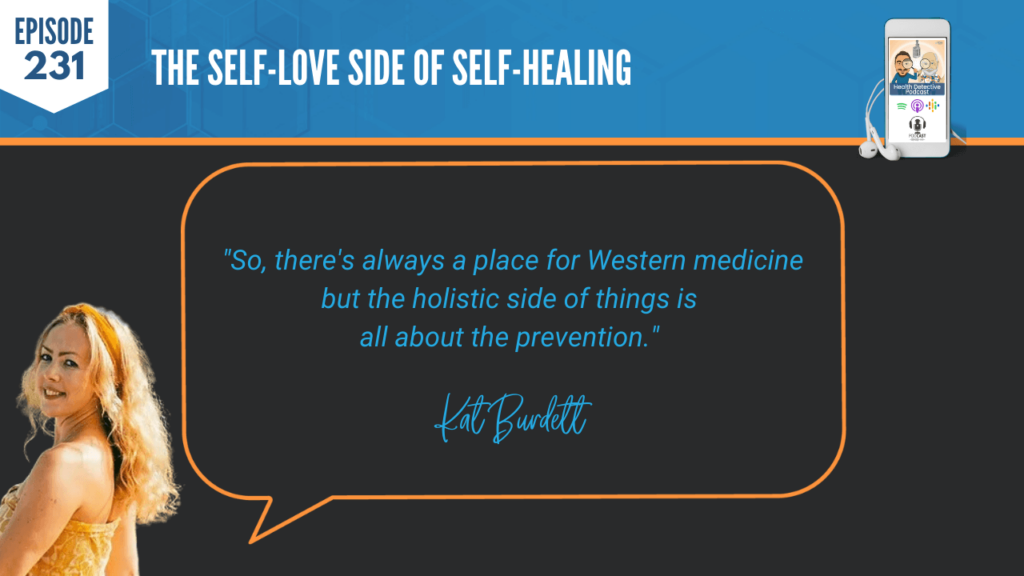
So, there’s always a place for Western medicine but the holistic side of things is all about the prevention. It’s all about changing your lifestyle so that you hopefully never reach that point of needing the Western medicine. I think everything is needed, absolutely.
[00:13:38] Detective Ev: Yeah. You said you’re in the UK correct?
Kat Burdett: At the moment. Yeah.
Detective Ev: Awesome. Well, it’s interesting because every month you get your stats on the podcast, of course. The United States is always our number one, but number two and three is usually a competition between either like Canada, UK, or Australia. So, UK’s actually winning this month, which is interesting.
Self-Love: Provoking a Healthier Lifestyle
I’m just curious, I know this isn’t the point of the podcast, but it’s worth talking about. What is the perspective over there? Because I’m starting to think about a general American perspective.
I do believe a lot more people now are open to the idea that natural might work. But even more so, which again is not necessarily a great thing, it’s more that Americans are against Western medicine as opposed to being open to the natural side. Like they think the doctor is screwing them over, which I’m not saying is correct. I’m saying that they think that. But they don’t have any other solutions like we might have on this podcast, so they still end up subject to it.
Do you think people in the UK, are they more naturally minded? Are they thinking about these things or do they just kind of get the diagnosis and do what they’re told?

[00:14:40] Kat Burdett: I think it’s a real mixture, to be honest with you. I think the people that are more in touch with themselves and who have more self-love, they’re the ones that kind of dig deeper and try and find these natural remedies. People who look after themselves, you know, if you love yourself, you look after yourself; then you lead a very different kind of lifestyle. You start to look for more natural, organic things.
But there are people, of course, just like in America as well, who don’t care, who have no self-love. They don’t look after themselves. They’re possibly overweight or whatever the issue might be. You know, they’re the ones that end up needing the support of the system.
Self-Love: How About an Actual Healthcare System?
The difference in America to the UK of course, is we have the National Health Service, so that’s free healthcare. People become very reliant and dependent on it. It means that they don’t always take responsibility for their lifestyle. It’s actually putting a lot of strain on the NHS.
I could go off on here now and talk all about how the government still sells cigarettes and sugary products on the shelf and processed food and things like that. I’m not gonna go off on that tangent, but just to say, it’s not really helping. And I don’t think the system is working to promote health and wellbeing.
[00:15:54] Detective Ev: Well, I appreciate you not going off on the tangent, but I think that’s a good point though. That’s actually the first even mild critique I’ve ever heard of the free healthcare thing.
We have employees that work in Europe and stuff, and they’ll look at it as almost like primitive or barbaric that we have the healthcare system that we do here. I am not making a political statement one way or the other, but we’re constantly going back and forth with the debate in America.
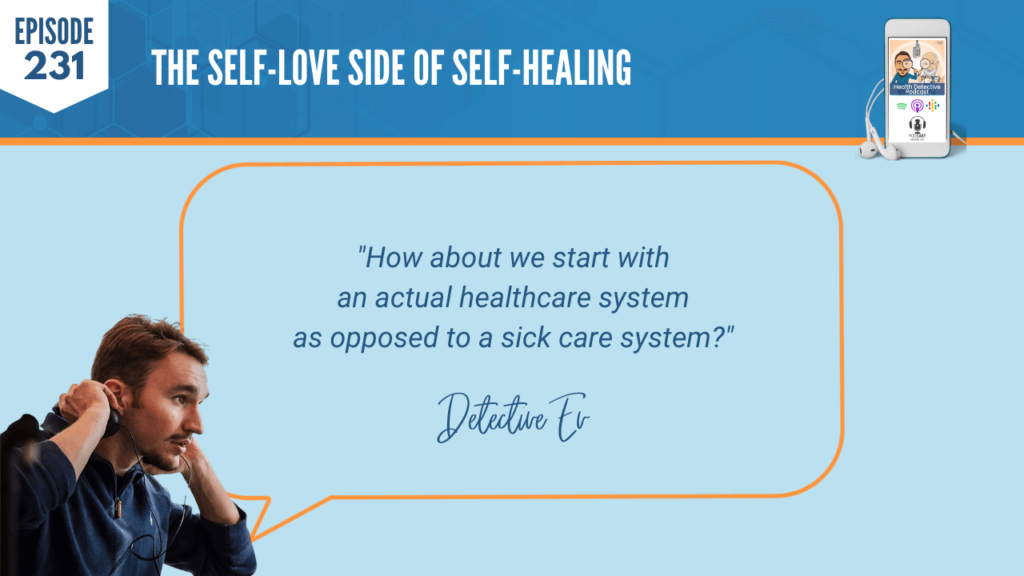
Like even in America itself, it’s debated the free healthcare universal versus the more private stuff. I’m like, why don’t we start with this before we debate any of that. How about we start with an actual healthcare system as opposed to a sick care system? Because what you just talked about I think is a key thing that people miss. Since they are so reliant on it and people aren’t taking responsibility for their health, it’s just adding more and more of a burden.
Self-Love: Trust & Reliance on a System
We can all agree. I think even the most liberal of people would certainly agree that free healthcare, if everyone is sick, is not going to work. I actually believe that there’s probably a reality where the private stuff or the universal healthcare can work if people are actually getting treated with health stuff instead of just sick care stuff once they have a chronic disease or cancer.
I think both of these actually have their validity and you can make a case for either one. But we can’t even start to argue this until we actually have a system that gets people healthy. I’ve never heard that perspective of like people just being reliant on this. So, there’s almost a thought process then, you’re saying, for some people that, oh, well health doesn’t matter because something will take care of me.

[00:17:20] Kat Burdett: I think so. I mean, it’s like if you always know that someone’s gonna be there to catch you when you fall, you’re not gonna be as careful. Do you know what I mean? Obviously, I can’t generalize it. And that’s not the way everyone thinks.
Actually, there are some people who do a beautiful job of taking care of themselves. But I just have noticed that in our society here, that there are some people who literally do depend on that and also the government and things like that because we do give a lot away for free.
But it is a wonderful, wonderful system. I think it’s one of the best things that we’ve got here actually.
[00:17:54] Detective Ev: Interesting perspective. Thank you.
Self-Love: The Beginnings of a Transition
All right, so going back to your personal story then, and we’ll talk about what you’re doing today. Thirteen years in a career, I mean, I know back in the day people stuck with things for like 40 years, but I think nowadays, 13 years is actually a good amount of time. Everyone is normally hopping around a different thing.
You said yourself, you’re surprised sometimes when you see people that were doing the job that you were doing that have been doing it for 20 or 30 years. At the same time, I feel like the longer you’re in something, it’s almost hard to leave that. You kind of become routine, it’s what you know. Even though the job is so tough, there’s an odd level of comfort in the certainty of what’s gonna happen that day. I mean, these patients are super sick, but you kind of know what to expect.
So, after 13 years, what’s your final moment? I don’t know if it’s some big, dramatic thing, but there had to be a point where you say, hey, I’m not doing this anymore. I’m going and doing something else. What did that point look like?
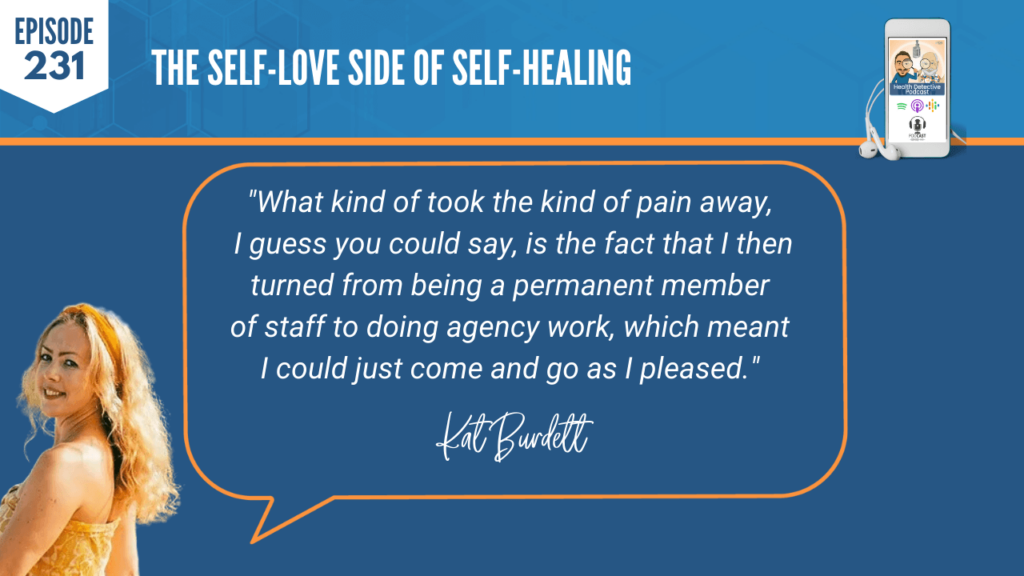
[00:18:47] Kat Burdett: Well, I mean, I started to get the sense that this wasn’t for me after only probably like six years into the profession. What kind of took the kind of pain away, I guess you could say, is the fact that I then turned from being a permanent member of staff to doing agency work, which meant I could just come and go as I pleased. I could take a contract wherever I want and stay for as long as I wanted and have a rolling contract. That took the pressure off a bit.
Self-Love: Living Out of Alignment
I literally spent many, many years, post those six years, trying to work out what the heck it is that I wanted to do. Again, you get guilted and shamed into the fact that, oh, but I’ve done this degree, I’ve put all this hard work in, and I’m helping people. You are fighting with yourself on it because you’re like, well, I’m doing a job that’s worthwhile. Why can’t I be happy with this? Why can’t I just accept this? Then it got to the point where, like I said, I got so burnt out.

I like to say that I was living out of alignment with my truest self. It wasn’t what I’m really here to do, which I obviously now know. Because of that, when you’re doing something that takes you out of alignment, it completely burns you out. It deducts your energy. Anything that’s good for you, that’s right for you personally, will give you energy. It was just taking and taking and taking. So, I got to the point where I was just so miserable.
I think it was actually one of my best friends who said, but you don’t have to do this, do you? You don’t have to conform to society. What’s stopping you? You know? That was a really key moment for me. I went, yeah, you are right. Why am I doing this? Then I also had to wait until I found coaching as well. That trickled in very, very slowly. And that’s a whole other story. But yeah, I think it was a combination of the fact I got to the point where I was like, I can’t carry on like this. I’m so unhappy.
Self-Love: Set Free
I think this is like the crucial transformation point for a lot of people when they actually start asking for help because they reach their breaking point. The thought of staying where they are is scarier than the thought of going into the unknown and doing something completely different that they have no idea about. This is where I meet a lot of my clients. This is when you want to actually do the coaching. So yeah, that’s where I got to.
Then I got to the point, actually, of desperation. I started to think, what can I do? I was like, I literally need magic and miracles to get out of this situation. I found this manifestation course. Something that a lot of people don’t know is manifestation actually teaches you about self-love. It’s the work that I’d never done before.
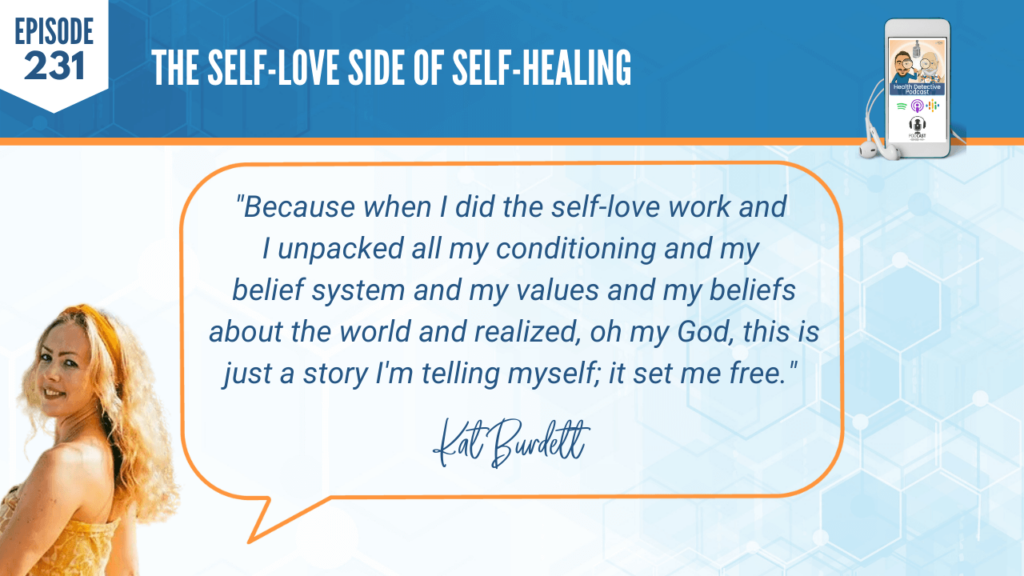
I started to go through this course and then I built a lot of love for myself. It made me realize that I wanted to help other people figure out this key piece of the puzzle. Because when I did the self-love work and I unpacked all my conditioning and my belief system and my values and my beliefs about the world and realized, oh my God, this is just a story I’m telling myself; it set me free. Then I was like, you know, I can do anything. I can be anyone I want to be. That opened my mind up more.
I ended up, from that, loving the personal development work. I got a coach, and I was like, I don’t know what’s wrong, but I know I’m stuck somehow. I want you to help me get out of it; and I want to have more confidence.
Self-Love: Starting to Coach
He was incredible. We didn’t even do the whole course. We did like six weeks of coaching. Then after that I was like, this is what I want to do. I want to be a coach. He’s one of the best in my belief anyway, in my personal opinion.
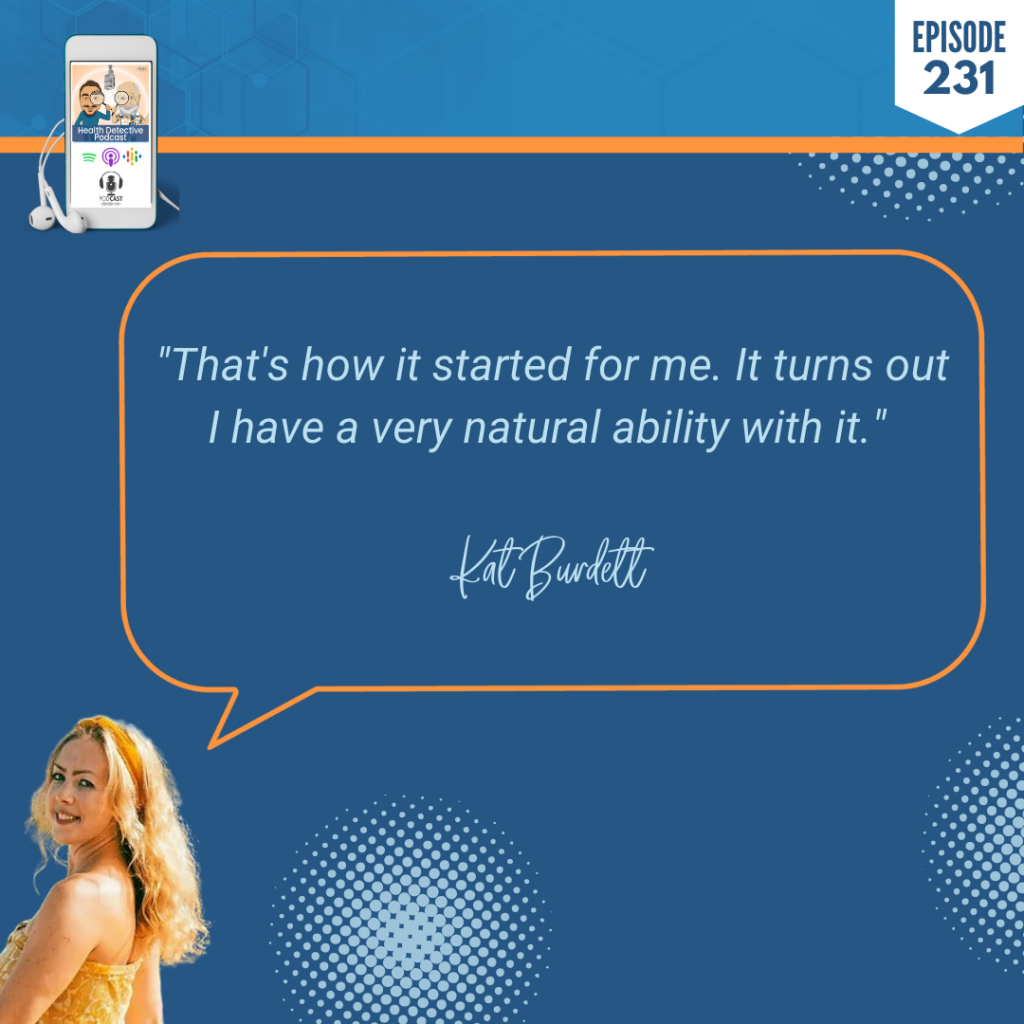
Then I just offered the girls that I’d met doing the manifestation course, I just said, look, I don’t know what I’m doing, but would you like me to coach you? I would love to give it a go. That’s how it started for me. It turns out I have a very natural ability with it.
[00:22:53] Detective Ev: That’s so cool. I like the courage that it takes to do these things. Because whether or not it’s an identical path to a lot of like what our practitioners do, where this perfectly relates is all of our practitioners, I mean, literally every single one, was in this separate career that maybe they enjoyed or some of them didn’t enjoy it at all. Then they had to make this transition at a certain point to go do the things they want to do. That is very scary for a lot of people, and it does take some courage to go away from that.
And I love what your friend said about like, who says you have to do this? Like, why do you have to follow these societal norms? It’s weird. I don’t know if I got this from somewhere, if I’ve just always been like that. I feel like I’ve been that way to the extreme.
Self-Love: Learning the New While Still Doing the Old
It’s been to my detriment at some point because I’ll just go do whatever I want, kind of. That’s great in a certain way, but you have to learn to manage that as well so that you could still fit in with society, make money, and be productive in that way.
But I think it’s so cool when there’s these people that have these breakthrough moments where it’s like, I can just go do a job that I like or I can create something for myself that’s like my perfect schedule and I can help other people and serve others. I think that’s just very powerful.
So, how long did this transition actually take? Just so I have the timeline from like the day of, hey, I’m not working this job anymore, to being able to do your own thing. Were you starting to do your own stuff while still working at the job?
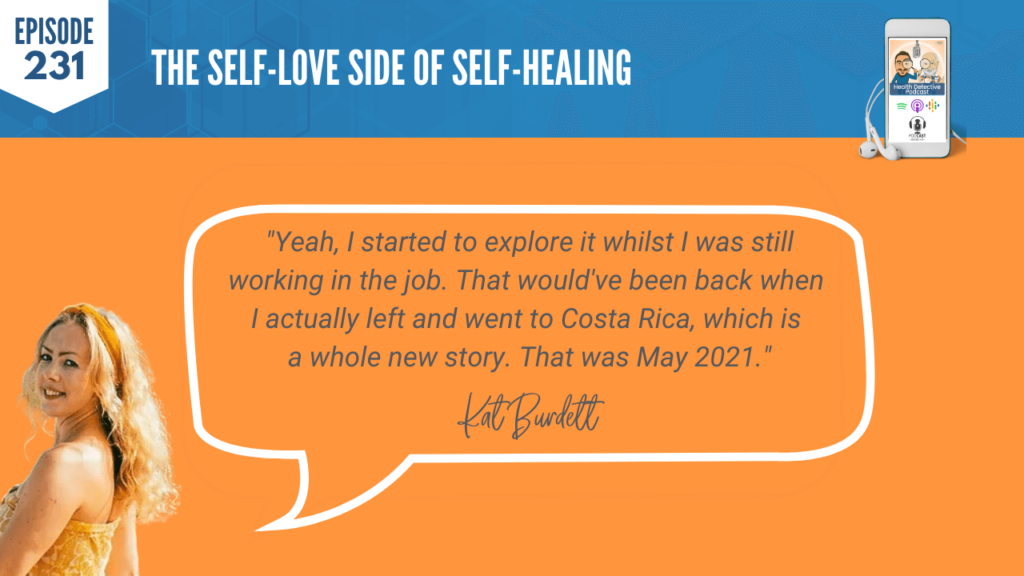
[00:24:11] Kat Burdett: Yeah, I started to explore it whilst I was still working in the job. That would’ve been back when I actually left and went to Costa Rica, which is a whole new story. That was May 2021. That’s when things really started to change. Yeah, I was still obviously learning a lot about myself as well at that point. That’s really, I suppose, when it began.
And I first started coaching, I think it was like February, March time of 2021. So, it hasn’t really been a whole lot of time. But as I say, it was just something that came very, very naturally to me, I think, because I’ve worked with patients for so long now as well. It’s just that instant rapport, and understanding, and intuitive understanding of people. Yeah, that was the beginning.
Self-Love: Kat’s Ideal Client
[00:25:01] Detective Ev: So, over these last couple years, I mean, you are right, in the grand scheme, I guess two years isn’t that long. But in a business side, you can learn a lot in two years, and you develop skills, and figure out what you want to do.
Nowadays, at the time of recording this, who is the client that you like to serve? What problems do you like to solve for people? What I’m trying to say is, for those listening, if they’re like, okay, well I like her so far, she seems really cool. Can she help me? Who is it that you serve? Like what problems do you help them with?
[00:25:27] Kat Burdett: Mainly it’s people who, well, maybe they don’t even realize this, but people who don’t feel good within themselves. People who maybe are people pleasers, they feel under confident, shy. They don’t love themselves. Maybe they’re going down the path of self-sabotage with addictive behavior like drinking, drugs, sex, whatever it is. People who just genuinely know that they’re worth more and they know they have more inside of them, more love to give, more to offer the world. But for whatever reason, they just can’t move past that point.

Really the main thing that I help people with is how to look after themselves with self-care, how to love themselves, and doing all the mindset work that goes with that as well, rewriting the old stories and the limiting beliefs that they may have.
Self-Love: What Does Self-Love Look Like?
I used to wake up and I just felt this sadness in my heart and this pain, it was like a little niggle of pain in my heart. I just didn’t know what it was. Later I discovered it’s because I was living out of alignment with my truest self, with my purpose, with who I’m meant to be. I wasn’t loving or respecting myself.
So yeah, those are I guess my peeps.
[00:26:50] Detective Ev: Sure. Well, and I know when I was reading your stuff, self-love is a huge core concept. We already kind of alluded to this because one of the things you mentioned, you’re like, people who have self-love look after themselves. Now you just kind of listed that in the rest of the sentence, but I thought that was pretty important.
Self-love, again, something that gets thrown around a lot, but what does that mean to you? What does that look like? Because I don’t think most people are engaging with self-love, maybe we always have room for improvement there. But how do you even define that? What does that look like?
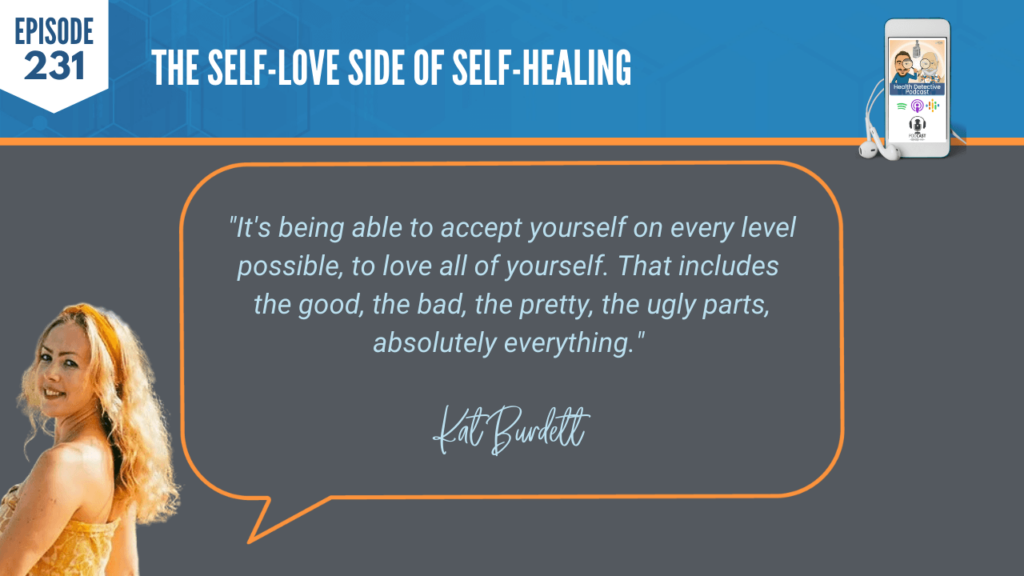
[00:27:15] Kat Burdett: Great question there, Ev. It’s being able to accept yourself on every level possible, to love all of yourself. That includes the good, the bad, the pretty, the ugly parts, absolutely everything. It’s the ability to be able to trust yourself, to know your own self-worth, and to be your biggest cheerleader. Also, to show your mind, body, and soul, the respect and love that it needs.
Self-Love: The Antithesis of Self-Love
[00:27:44] Detective Ev: Cool. This is kind of a fun topic because the self-love thing, the reason I asked for your definition is cause I like that. I think that makes sense.
One of the things that I see get thrown around a lot, and this is more in the people that maybe they’re like early twenties, I feel like, throwing this around. Maybe that’s just cause what I see on Instagram. I’m not sure. But sometimes the self-love, I wonder where the line gets drawn or if this is a misrepresentation of self-love. That’s why I’m curious what you think. Because there are people that I’m seeing promoting the self-love thing that are clearly very unhealthy, very unwell in what they’re doing habit wise. But the self-love to them means that they will continue those unhealthy habits that are keeping someone 300- or 400-pounds overweight.
I want to also put a disclaimer on this so I don’t tick anyone off. I am not going against the whole body positivity thing where like someone is clearly not overweight but they just don’t look like a Victoria’s Secret model, or someone is a totally healthy guy, but they don’t look like Arnold Schwarzenegger. No, you can be healthy and not have model-level bodies. That’s not what I’m saying.

I’m referring to the guys or girls out there that sometimes you see people who are clearly morbidly obese. That’s not even a question, they would meet that. There’s this self-love movement, well, they put it as self-love, I don’t know if this really is, where, oh, okay, I need to accept myself as I am. But also, I’m going to keep engaging in these habits that keep me unhealthy. I feel like that’s the antithesis of self-love.
Self-Love: Where Does the Line Get Drawn?
Now, that doesn’t mean you should be judging yourself every single day and saying, oh my gosh, I’m such a piece of crap. That’s not what I’m saying at all.
I’ll speak for myself at least. I had severe cystic acne at one point. That’s one of the reasons I got into FDN. I learned to realize that acne does not define who Evan Transue is. I’m still a good friend, a good family member, a motivated person who wants the best for others. But I also realized that, yes, severe cystic acne was a warning sign from my body, nor was it the most attractive thing. I’m just being honest. Not many people wanted to date when I had severe cystic acne. I don’t think that makes them bad people.
Where does this line get drawn between actual self-love that you’re talking about and this self-love that’s being promoted online, which I’m sure you’ve seen this? Where I don’t think that’s actually self-love at all if you’re still sick and you don’t feel well.
[00:29:59] Kat Burdett: I mean, yeah, it’s about being healthy. At the end of the day, you’ve gotta be honest with yourself. This is where a lot of people struggle because it’s almost like you don’t want to admit that you have a problem. Because if you are hurting your body, then you’re not loving your body, are you?
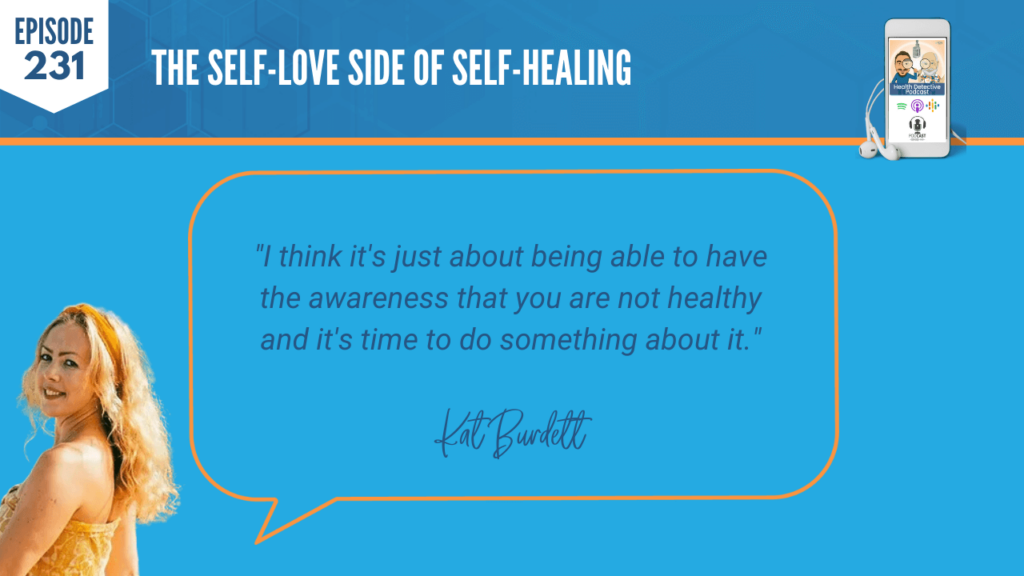
If you are hurting your body and you’re putting a strain on your body, you are raising your blood pressure because you are overweight or maybe you are smoking every day, you are not really loving yourself. I think it’s just about being able to have the awareness that you are not healthy and it’s time to do something about it.
Self-Love: Where Did Those Thoughts Come From?
I think it’s a difficult one and I hear what you’re saying there. The line, I guess, can be blurred. But of course, you gotta love yourself through that process as well. You gotta be honest and think that the reason that you got yourself to this point is because there was no love for yourself.

What really makes the transformation is finding out where those thoughts actually came from. Because I think until you actually change your beliefs and your values and things like that and your limiting beliefs, what’s holding you back from feeling good, you are never, ever gonna move forward. Also, if you did lose the weight, it’s probably gonna come back on because you’re not getting to the root, core issue. If you truly loved yourself then you wouldn’t be treating your body that way. Does that make sense?
[00:31:26] Detective Ev: It does. And I have a follow up with it. I’ll use myself as the example cause I’m not at all casting judgment towards other people. I just actually want the best for all of us, so that’s why I’m bringing it up.
So again, I’ll use myself. All right. Let’s say I’m back in the day when, again, severe cystic acne, it’s not attractive, it’s not pretty. There are certain objective things, right? This isn’t just subjective, like objectively, people were not interested in going on a date with someone who looked that way, and I don’t really blame them. I’m talking about myself now.
Self-Love: Utilizing Mindset Work
It’s a little different, listen, if you’re already dating the person and someone develops severe cystic acne, yes, you love the person and you work through that. But guys, there’s initial attraction, there’s things that you need to provide at the table initially if you’re trying to woo over a potential partner.
With that said, I think where this fake self-love is coming in, where it’s like they continue the bad habits, but they love themselves, is because we don’t want to feel like crap about ourselves all day. I know I don’t want that either. So, let’s say I’m working with you. How do we even start to handle this?
How could you help me work through, okay, I have the severe acne. We know I have to make different health choices. I need to get myself better. But how can I live a more comfortable life so that I don’t go into the mirror every single day hating myself or feeling low? Because I think that’s the best of both worlds. I think that’s what people are actually looking for. On one end they have this, on another end they have that. We need to merge them. So, what would you do for someone like me?
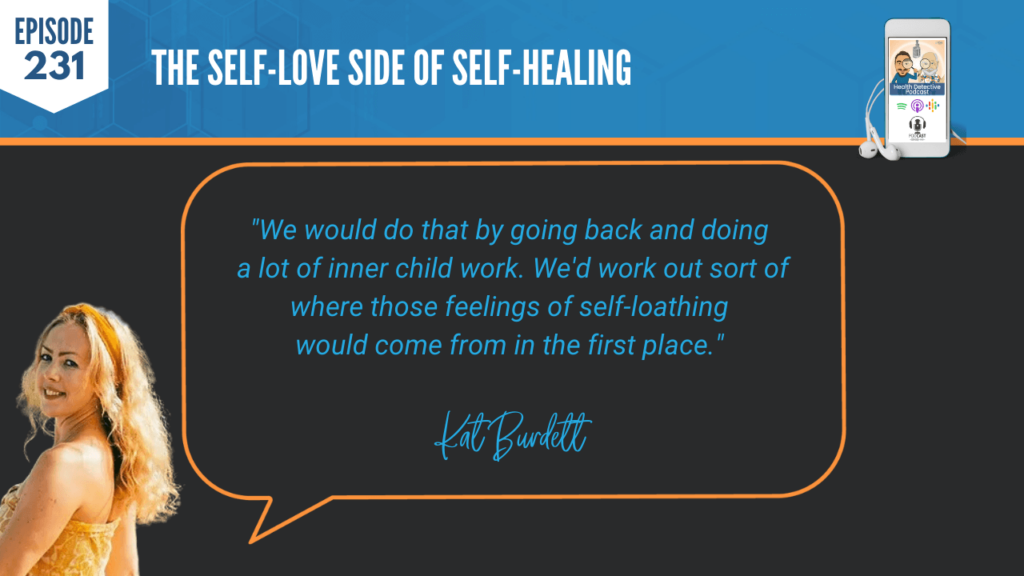
[00:32:48] Kat Burdett: I think what I do with you and what I do with anyone in that situation is to help them positively rewire their brain. Because you are also in a position where you are not loving yourself and you’re being rejected constantly. We would do that by going back and doing a lot of inner child work. We’d work out sort of where those feelings of self-loathing would come from in the first place. There would be a lot of mindset work involved.
Self-Love: Naturally Reprogramming Yourself
But it’s also about learning how to create good habits as well. Something that I like to do with a lot of my clients is positive rewiring by means of affirmations and gratitude. Affirmations can sometimes get a bad rep. Like, oh, you know, they don’t really work, but people do often unrealistic affirmations. I think that self-love affirmations are really, really incredible and really powerful. They do work and it’s been scientifically proven.
Actually, what has more impetus here is if you stood in front of the mirror and you looked yourself dead in the eyes and said, Evan, I love you. Then you started saying, I am doing the best I can. That’s like an example of an affirmation. I love myself regardless of my acne. You are saying things like that.
I’d probably create a list or help my client come up with a list themselves of what they want to say to themselves. We’d take like, maybe a negative and we’d turn it into a positive. Then what you need to do with affirmations is, and this is the neuroscience bit, is you want to repeat them. Because if you say that once, it’s probably gonna make you go, yeah, maybe. Or maybe I don’t believe it. Even if you’re saying something to yourself that you don’t believe, that’s okay, it doesn’t matter cause this still works.

What happens is it takes between 30 to 90 days to rewire your way of thinking. It’s all about repetition. When you repeat, you are building the Neurosynaptic pathways. It’s like a rubber band, like you fire more neurons and the band gets thicker. It means that naturally, you’re basically reprogramming yourself. It means that your default is gonna go to there instead of going to the negative.
Self-Love: Former Client Story
So, I think one huge thing I would do is affirmations.
[00:35:06] Detective Ev: Awesome. I like that cause it shows that, we can still be accepting of ourselves in the moment, which I eventually learned and I think that’s important. I was not less of a person because of this.
But there can still be, again, going to the dating thing, there can still be objective truths and things that attract people and don’t attract people and I can work through that. In fact, one of the only ways to really effectively work through it is to accept yourself as you are in that time. I think that makes a lot of sense.
With the clients that you work with nowadays, do you find that a lot of them are dealing with some type of chronic health symptoms? I imagine that’s part of your work.
[00:35:41] Kat Burdett: Well, the clients I’ve had so far, I haven’t come across that.
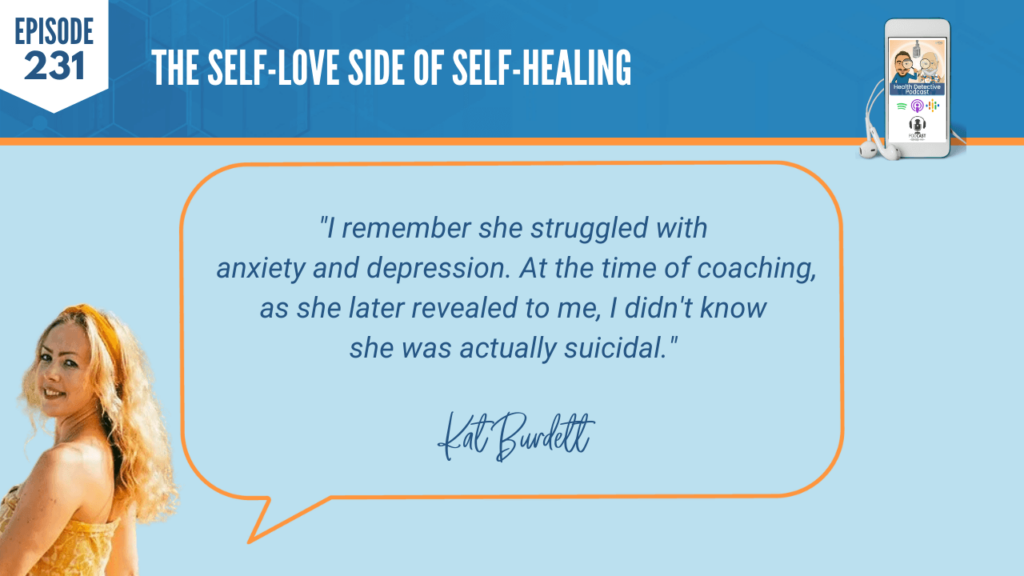
I’m just thinking back, there was actually one person who I coached right at the beginning for free. I think she wasn’t ready really for the coaching, and maybe I was in a bit above my head. I remember she struggled with anxiety and depression. At the time of coaching, as she later revealed to me, I didn’t know she was actually suicidal.
Who knows if I helped her there from preventing her to actually take her life. I don’t know. That would be amazing if that was the case. But yeah, that was like probably the worst sort of mental health issue that I was dealing with. Although, I didn’t really know I was dealing with it. So, probably not the best example.
Self-Love: The Normalcy of Down Days
But mainly it’s just this lack of confidence really within oneself. You know, it’s difficult, isn’t it? Because I think we blur the lines with mental health quite a lot.
You know, you can have days where you feel down, you can have days where you feel depressed, or you can be suicidal. I think when you’re not feeling good within yourself, that is in itself meaning that you are dysregulated mentally. This is where it’s difficult, you know, the therapist coach situation here. Somebody who’s not at the point of suicide, yeah, I can definitely help because they’re not that bad.

But I just wanted to say that as well, it’s important to recognize that everybody goes through a mental health issue or a mental health disorder at some point in their life. Like it is a normality and it’s okay. So, for anyone listening, I want you to know that you are normal. It does not make you abnormal. Everybody goes through this at some stage of their life.
[00:37:37] Detective Ev: Sure. Wow, that’s powerful. I was asking because to connect this all together as we get to our last 10 minutes here, I was seeing if you noticed any common themes in people who dealt with the chronic health issues, cause that’s part of our audience. But where I’m almost seeing them like, duh, this is actually where this applies even more. If you are helping a lot of people really work through the confidence side, then I already know what we need to talk about for the last 10 minutes.
Self-Love: Believe in Yourself
Our practitioners as wonderful as they are, they are super smart. They’ll take all the courses, they go through FDN, they have a system that they know works and yet some of them soar to the top in business and stuff. Six figures, killing it. Love what they do. Then others will be with us for two, three years hanging out in the groups, and they barely get one or two clients. But they have the same systems and same certifications. I know it’s not because that the other half is like, bad people who are doing something wrong.
I really do think it’s this lack of belief in themselves and what they offer despite them having a system that they know works because it worked for them. I feel like you probably have something to offer those people, in a sense, in terms of helping them actually like get started with their business and realizing they are worth doing this work.
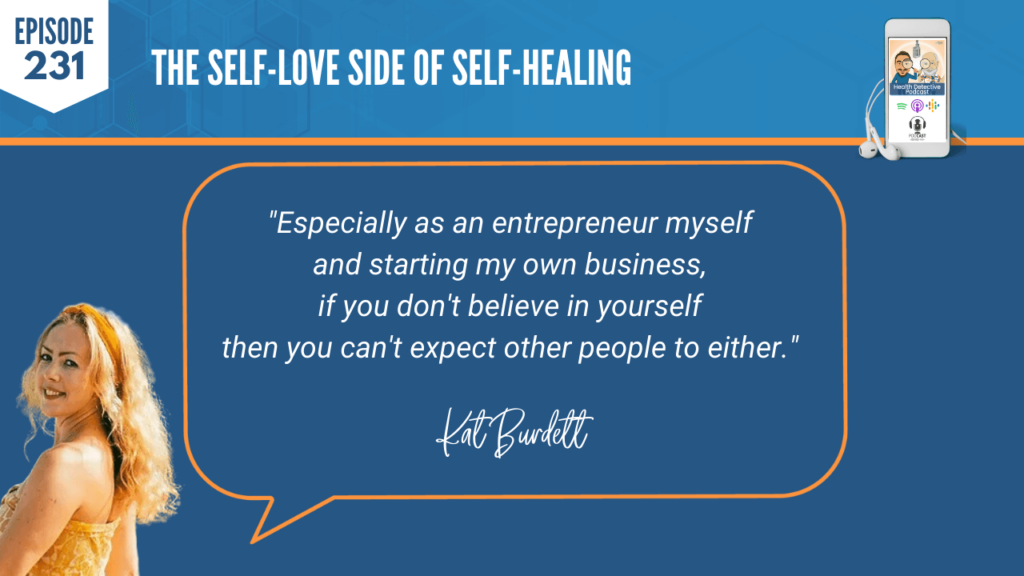
[00:38:48] Kat Burdett: Yeah, absolutely. I mean, it really all comes down to self-belief. Especially as an entrepreneur myself and starting my own business, if you don’t believe in yourself then you can’t expect other people to either.
In terms of growing your self-belief, it’s about pushing through your zone of discomfort, I guess, and not giving up on yourself. That can be like really, really difficult to do. For me, for example, I used to be so shy and so anxious. In social situations, I would literally want to just run away and cry. I was so worried about what I would say that would be the wrong thing. I just didn’t trust myself at all, that my opinion was valid. I always thought I was in the wrong.
Self-Love: Support & Guidance
The only way I got through that is by putting myself in my zone of discomfort. I forced myself to be in those situations and I kept showing up and kept showing up until it became easier. Then eventually my self-belief grew. So, I think a big part of it is facing those hurdles dead on.
Also just, again, affirmations are really powerful. I mean, I do find them powerful; just telling yourself that I am capable, I am worthy, I am powerful, I am doing the best I can. It sounds like nothing. But if you say that every day to yourself, then it is really, really powerful.

Another aspect to that is understanding that I do believe that there is, I don’t like to call it God or whatever, but I think there’s some form of like universal intelligence out there. Because of things that I’ve been through and having a spiritual awakening, I used to be an atheist. I had a spiritual awakening, and I was like, oh, well I was definitely wrong about that. It helped me to realize that I’m not alone. Actually, you do have a lot more support out there than you realize.
So, I think having faith in something and knowing that you are divinely guided and supported, I think that also really, really helped me. There were lots of signs along the way that would come up that would make me go, oh, okay. So yeah, I’m doing the right thing, I’m being listened to, I’m being supported. That’s just another angle I wanted to bring in there. Take it or leave it.
[00:41:10] Detective Ev: Well, I believe in the guidance. I call it something different and don’t we all? But there is a guidance there in my opinion.
Self-Love: Learning to Trust Guidance
I think what happens is it’s scary to follow that cause it doesn’t seem logical at first, especially with our group of people. We have a lot of science-based, logical type people. That’s why they got into this work. My gosh, I’m preaching to the choir right now. That is me; I am that person.
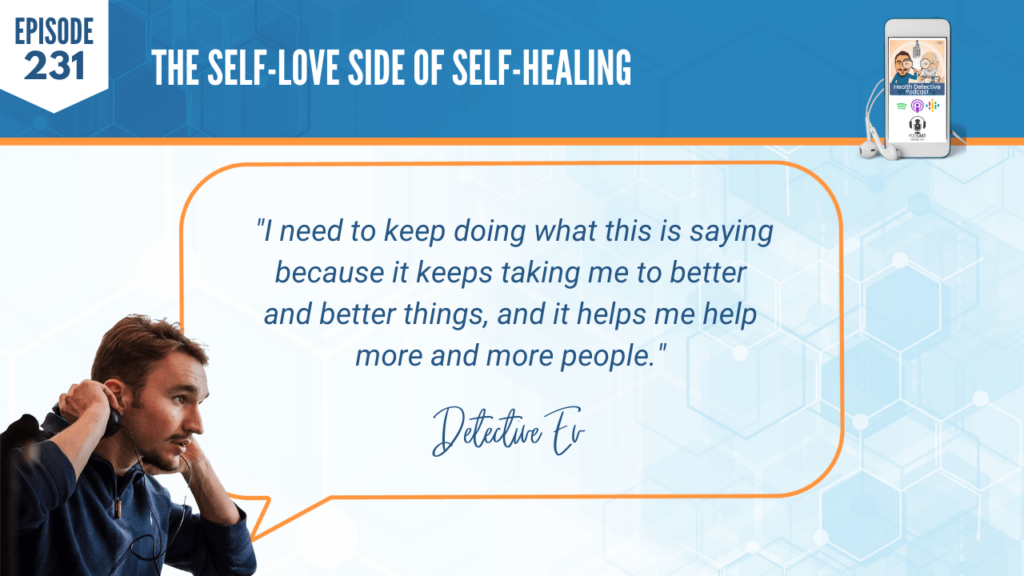
But as I learned to trust these little nudges that I would get, I realized it never once has steered me wrong. It always put me in the right place. I’m like, wow, okay; I need to listen to this. I need to keep doing what this is saying because it keeps taking me to better and better things, and it helps me help more and more people. So, I think if nothing else, just learning to trust that the rest seems to work out itself. It’s very odd. Very cool as well, how that seems to work.
I know we have to be still respectful of client’s privacy. So, to the degree that you’re able, I’m wondering is there any particular client testimonial or story or just thing that happened with a client that you’re really proud of and that really sticks out? I always like for people to be able to highlight some of the cool work that they’ve done with people.
[00:42:13] Kat Burdett: Yeah. I mean, one of my favorite client stories is probably one of my friends actually was going through a really difficult time with her partner. She’d been physically and verbally abused. More verbally, but there was some physical abuse as well. She was caught in this toxic pattern, in this toxic cycle.
Self-Love: A Client Success Story
I obviously knew she’s an amazing person, loved by many, beautiful soul, beautiful heart. She can do so much better. Also, she doesn’t deserve, of course, to be treated that way.
It was only through my coaching that it gave her the confidence to leave him. It took a long time actually. It was maybe six to eight months after we finished working together. Because obviously when you do this work, you are changing your internal state, and you’re changing your mind literally and your mindset, so it always stays with you. This is why this work is so powerful, it keeps going forever. You’ll never be the same again.

Basically, it also sometimes needs time to sink in and for that person to feel safe within their body in order to take different action. Anyway, she got to the point where she left him and now, she’s absolutely thriving. Her business is doing incredibly well and she’s just so much happier. She’s glowing inside out and she’s actually saying no to the things that are bad for her.
I’m just so proud of her and so grateful that I could help her. It made me realize just how powerful this whole process is giving somebody that amount of self-belief and self-love.
[00:43:54] Detective Ev: That’s awesome Kat. That’s not even the route that I thought we were gonna go, so I appreciate it even more.
Well, because that stuff matters, man. When you’re with someone that is bringing you down, like the partner thing is either the biggest win or the biggest loss. They are either going to strip you of what you are or they are going to support you in doing your thing and being the best that you can.
Self-Love: What About Those Draining Relationships?
And it amplifies either of those to like the 10th power. It’s crazy. I can’t even imagine like how much more rich this woman’s life is by being able to be freed of that. It’s cool. I mean, you even said how much richer it got, basically. You described the things that have happened. But there’s just a freedom there that comes from that.
I’ve been on both ends. You know, I’ve been the person that didn’t realize that they were not with someone who was ideal for them. Unfortunately, especially in high school, I was the person bringing the other individual down. So, I’ve done both things.
When you’re with the right person, I’m with a wonderful individual now, it’s cool. It’s like, oh wow, this is actually fun. This isn’t stressful. You know, I think so many people are stressed out of their relationships. You’re like, nah, it doesn’t really have to be that way. I mean, you’re gonna have hiccups just like anyone else. But no, like 90% of the time can be awesome and you’re just helping each other grow in every single sense. So that’s amazing.

[00:45:01] Kat Burdett: Yeah, thank you. I just sort of say, maybe think the kind of really key thing, and this may be hard for some people to hear. If you are in a relationship that’s not serving you, that’s making you feel less of a person or devaluing you in any way or even taking your energy, it is not right for you. But you also have to recognize, it’s your choice to remain there.
Where to Find Kat Burdett
Only through loving yourself, starting to love yourself, will you have the confidence to leave that person and to get out because you know that you deserve more. I just wanted to put that message out there because I felt like maybe someone needs to hear that.
[00:45:35] Detective Ev: Thank you. And Kat, where can people find you and your business? You can shout out social media, anything. Of course, we’ll have it in the show notes, but it’s always good for people to get to hear it.
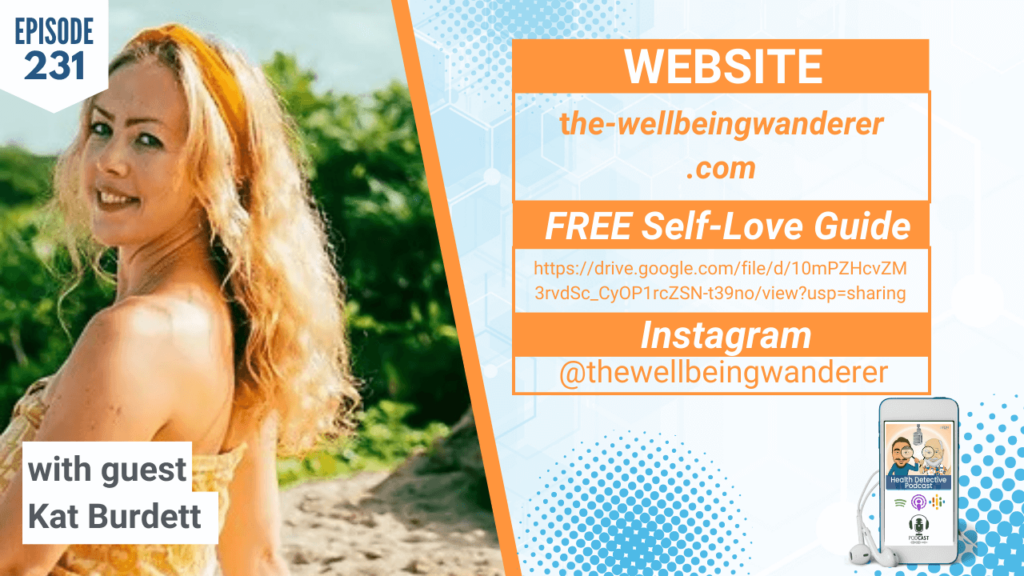
[00:45:44] Kat Burdett: Absolutely. If you want to have a laugh, my Instagram is full of ridiculous reels that talk about self-love and self-care and mindset work. That’s @thewellbeingwanderer. Then I have a website the-wellbeingwanderer.com. I put my full story on there, lots of free resources as well, and all the ways in which we can work together.
Conclusion
[00:46:07] Detective Ev: Awesome! Thank you so much for coming on today and giving this unique perspective. I think this is especially for a lot of the people who suffer with the chronic illness stuff, this stuff matters. And if this just even opens their eyes to maybe this being something they consider in their healing journey, I think that’s totally worth it.
Thank you so much for coming on today.
[00:46:27] Kat Burdett: Absolutely. You’re welcome. Thank you so much for having me.
For Kat’s FREE self-love guide, click here: https://drive.google.com/file/d/10mPZHcvZM3rvdSc_CyOP1rcZSN-t39no/view?usp=sharing
You can always visit us at functionaldiagnosticnutrition.com.
To hear more informative health supporting podcasts like this one, go to functionaldiagnosticnutrition.com/health-detective-podcast/.
To learn more about us, go to functionaldiagnosticnutrition.com/about-fdn-functional-testing/.

